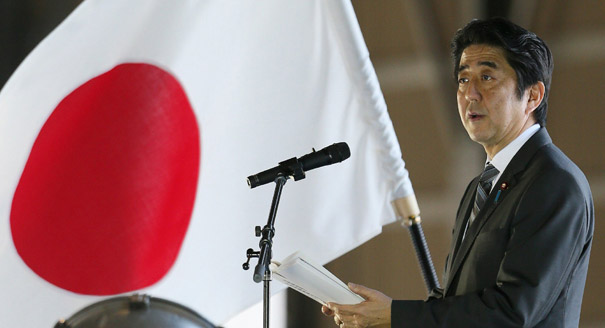Amid a media frenzy, Shinzo Abe’s election returned Japan to the global stage. The frustrated international community, eager to hear positive news, is watching Japan with a mix of hope and anxiety. Paul Krugman, the economic guru, has coined the motto “Japan the Model” praising Abe’s economic agenda, that is his monetary and fiscal stimulus—the Abenomics—and predicting that Japan will soon be the world’s economic paragon.
However, the Japanese have other thoughts about Abe’s victory. “Mr. Abe may push preparations for constitutional revisions,” explains an editorial in The Japan Times, “This is appalling because he has not explained in the election campaign what he thinks is wrong with the present Constitution…” Indeed, Abe may push for the revision of the Article 96 of the Constitution. As it currently stands, this piece of legislation stipulates that any constitutional amendments must be ratified by two-thirds of the Diet members; Abe would like to decrease this to a simple majority. If this is passed, it means that governmental procedure can be aligned more clearly with the leader’s wish. And we know that if the leaders start to change the constitution, they eliminate all checks on their power.
I would suggest putting Japan into a broader civilizational context. The key challenge of our times is the crisis of liberal democracies. One could observe how the dysfunctional EU and the United States have been looking—so far in vain—for a new pattern of governance and society consolidation. Japan faces the same problem. This is not only a matter of economy! This is a system that needs renovation! Japan is known for its ability to make political and institutional breakthroughs in times of trouble. It has done so at least twice in its history: firstly, during the Meiji Revolution in 1868, and, secondly, after WWII when accepting the liberal institutions (true, under Allied occupation). More recently, Japan has demonstrated its national ability to unify under crisis during the 2011 earthquake and subsequent Fukushima nuclear disaster.
Today the question is: will the breakthrough model suggested by Abe, that is the combination of financial stimulus, concentration of powers in his hands, new nationalism, military strength, and return to geopolitics, be successful? Many leaders, including Charles de Gaulle in France and Recep Tayyip Erdogan in Turkey, have experimented with this model of national revival. De Gaulle had succeeded in building the Fifth French Republic and energizing the nation. His experience, however, proved that developed society could easily become weary of a leader with authoritarian impulses and an assertive foreign policy. Erdogan looked like a winner too. But the Gezi park protest has demonstrated that Turkish society is not willing to substitute its political liberties for a stronger, more authoritarian, state.
We still have to see what Abe means when he prioritizes strategic interests above the domestic agenda, when he tries to appeal to patriotism and national spirit, and when he discusses the revision of the constitution. True, what Abe is doing brings another thought: what if Germany starts to follow suit? Let’s wait and see. The world is too afraid of raising the old ghosts. Maybe those who worry have no ground to be worried.
Anyway, we in Russia have been watching how Putin has been tinkering with the constitution and how this has ended. True, the Japanese society has acquired the gene of democracy’s resilience. But still—sometimes it is good to share the experience.
